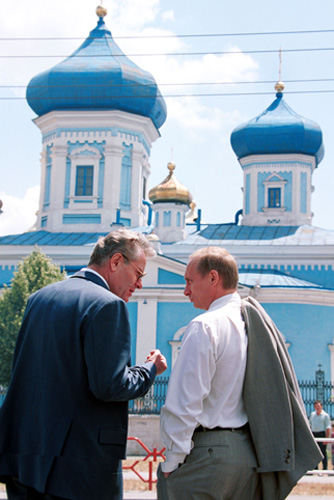The Republic of Moldova: Lost in geopolitical games
Recent public opinion surveys as well as the results of a referendum in Gagauzia indicate that the Moldovans’ sympathies are shifting away from the EU and towards Russia. Is this a cause for concern?
February 19, 2014 -
Mila Corlateanu
-
Articles and Commentary

Vladimir Putin with Moldovan President Petru Lucinschi in 2000 Photo: Presidential Press and Information Office
A public survey: perceptions and attitudes
If you had to choose between a union with the European Union or Russia, what would you prefer? According to a nation-wide representative survey carried out by the Slovak Atlantic Commission (SAC) and the Central European Policy Institute (CEPI), 44 per cent of Moldovans chose the EU over the Eurasian Customs Union (ECU), while 40 per cent preferred the former. These results presented this week in Chişinău created a ground for ardent discussions. Since 2009, when 55 per cent of respondents were for the EU and only 30 per cent were for Russia, one can see a clear drop in the public support of EU and its policies. Asked about the development direction of the country, only 28.7 per cent of the respondents confirmed that Moldova is on the road to progress. Hence, the public dissatisfaction with the process of European integration develops into a high level of interest in ECU.
Furthermore, in terms of ensuring trade and employment, only a quarter of respondents see the partnership with the EU as a beneficial one. Speaking of self-esteem, Moldova is being qualified by its population as backwards, dependent and undemocratic. Moreover, two out of five respondents think that the EU perceives Moldova as a second-class partner country, while the main possible consequences after the signing of Association Agreement with EU are expected to be rising living costs (62 per cent) and substantial pressure from Russia (56 per cent). Around one-third of the interviewees would prefer a balanced cooperation with both regional powers (the EU and the European Customs Union), as they believe that the EU and Russia are rivals in the eastern region.
Finally, the public survey based on a representative sample of 1,000 respondents aged 18 and above from 56 localities once again brought out the limited knowledge and understanding of the ongoing projects (for example, only one in six respondents could correctly identify the partner countries in the Eastern Partnership).
Pure realism
The presentation of the survey’s detailed findings entailed mixed reactions regarding the emerging scepticism among population. Meanwhile, the realistic approach shows that the disillusionment in the perceptions of the EU and the growing fear of changes is an unavoidable step of the transition period for Moldova.
Pirkka Tapiola, the head of the EU Delegation to Moldova, says it would be a mistake to qualify the results as either pessimistic or optimistic ones: “The fear of change is a rather natural occurrence. It is also good to pass this transition stage and to have time, as normally there are no here and now solutions.” According to the ambassador, what counts now the most is domestic politics: “We are not going to play the game called ‘geopolitical competition’. Our main interests are prosperous and well-governed neighbours. Moldova can become one of them if ‘Do-It-Yourself Reforms’ are successfully implemented.”
The polarisation of public opinion, which became apparent from 2009 to 2013, was in fact stimulated by the transformation of political parties into “geopolitical” ones. In this way, people who previously supported integration with the EU because of the Communist Party (the governing party until 2009) today lean towards the ECU, which is promoted by the same party (which is in the opposition now). Therefore, the vector, be it the EU or Russia, is often confused with the vector’s promoters (the coalition vs. the opposition).
A lack of political consensus
Still, one should not forget that the survey was conducted in Moldova between October 19th and November 7th 2013. What events have happened since then? Can this survey be analysed and explained through the prism of more recent events?
In December 2013, Transnistria voted for the “Implementation of the Legislation of Russian Federation” project seen by the Moldovan authorities as a provocation. Then, two months after the third Eastern Partnership Summit in Vilnius, during which Moldova demonstrated some tangible results, the autonomous Moldovan region of Gagauzia organised a referendum and has thereby shown its clear support (98.4 per cent of voters) for closer relations with the Eurasian Customs Union. One of the stated reasons is the unwillingness to unite with Romania. Even if this idea has been vocalised dozens of times by the president of the neighbouring country, joining Romania has never been on Moldova’s integration agenda, as the country runs through the ongoing formation of the multicultural nation.
Obviously, the discrepancy between Chişinău and the regions’ views on future actions damages Moldova’s integrity. Nevertheless, it did not stop the European Parliament from voting on February 12th for visa free travel for Moldova. The decision is not final yet, but supposedly by the summer of 2014 the Schengen zone will be open for Moldovan citizens for 90 days during a six month-long period. Still, the instrument of European soft power called “supporting themobilityof citizens and visa liberalisation in a secure environment” will remain unknown to many Moldovan citizens simply because of the travel costs they cannot themselves afford.
However, at the moment the considerable contribution is expected not from the outer power centres but from the Moldovan government. Namely, it should be in charge of fixing up the internal conflicts, widening the dialogue and creating adequate conditions so that after a trip to the EU one would have a wish to come back home.
Mila Corlateanu was born in Moldova and studied at the Berlin School of Journalism and interned at the German Bundestag. She is a member of the International Francophone Press Union and is a regular contributor to the online magazine Europe & Me.

































